By Dashnor Kaloçi
Memorie.al/The repressive policy implemented by the communist regime of Enver Hoxha and his successor, Ramiz Alia, against Kosovar immigrants and those from other Albanian regions in former Yugoslavia who came to Albania from 1949 until the end of the 1980s, where a large part of them ended up in political prisons and internments under fabricated accusations of being “UDB agents,” does not appear to have been sporadic or isolated actions carried out by state segments that represented the wildest side of the “Dictatorship of the Proletariat,” such as those subordinate to the Ministry of Internal Affairs: State Security, the Investigation Office, the Prosecutor’s Office, or the Courts.
The brutal welcome and inhumane treatment reserved for many, many Kosovar immigrants in the “motherland,” who “fell from the rain into the hail,” undoubtedly constitutes one of the darkest stains in the entire history of the Albanian state over the last 100 years. This was a result of the political line followed by that regime and personally by Enver Hoxha, where behind every Kosovar who came to Albania, an “UDB agent” was seen, and as a result, with few exceptions, everyone ended up in internment camps.
In the early 1950s, the number of Kosovar immigrants who came illegally to Albania was so large that official Tirana opened an internment camp for them in the village of Llakatund in Vlora. But, as if by an irony of fate, the communist regime in Tirana led by Enver Hoxha, unlike how it treated our Kosovar brothers who came to the motherland to escape persecution and prosecution from the Titoist regime in Belgrade, gave an exemplary treatment to Yugoslav immigrants who fled their country and came to Albania because they were pursued by the Belgrade regime for their Stalinist and pro-Enver Hoxha beliefs against the policy of Marshal Josip Broz Tito.
These Yugoslav citizens were not only treated in a completely opposite manner to the Kosovars, but they were also allowed to have a newspaper (“Sloboda,” in Albanian and Serbo-Croatian), as well as a daily program on Radio-Tirana, and their representative in Albania was invited to all the congresses of the Party of Labor of Albania (at the side of Enver Hoxha), greeting “the achievements of Socialist Albania and the correct policy of the Party of Labor of Albania led by Enver Hoxha”?!
Therefore, the political line that official Tirana followed towards Kosovo and the Kosovars is clearly seen, among other things, from a note by Enver Hoxha on a report-information from the Minister of Internal Affairs, Feçor Shehu (dated July 29, 1980), where among other things he writes: “Kosovars should come as tourists and make good propaganda, but of course the Security will have troubles, because there are no troubles without troubles…!”
Thus, in that note by Enver Hoxha, a free hand was given to the State Security, as indeed happened, where dozens of Kosovar immigrants (or from other Albanian regions in Yugoslavia at that time) ended up in camps and political prisons, such as; Nazmi Berisha, Esat Myftari, Gani Demiri (Ratkoceri), Kapllan Resuli, Selim Kelmendi, (who died in Burrel prison), Estref Kelmendi, Shefqet Kaçaniku, Nuro Hoti, Myrteza Bajraktari, Arben Çeta, (the brother of Prof. Anton Çeta), Qazim Kreka, Dr. Jetulla Gashi, Shefqet Rexha, Riza Marevci, Isuf Visoka, Zeqir Rashti, Hysen Bukoshi, Sadri Ahmeti, Idriz Zeqiraj, Ibish Kelmendi, Rexhep Llazana, Ymer Llugaliu, Rexhep Ahmeti, Kolë Nikshiqi, Namik Luca, etc., etc.
If we consider these things that were happening in Albania with Kosovar immigrants and the position that official Tirana took towards the spring demonstrations of 1981, (we recall here the sensational articles in “Zëri i Popullit,” with a review of the world press about the events in Kosovo, the writings of the German correspondent in Kosovo, Viktor Majer, etc., the programs and news editions on RTSH, the book series; “What do the Kosovars say and ask for?” etc., etc.,) it seems clear that the position of official Tirana on the Kosovo issue was nothing more than a “for show” stance towards world public opinion and also a position for internal consumption.
So, in short, official Tirana said and propagated one thing, and in reality acted differently on the issue of Kosovo and Kosovar immigrants who had been in Albania for years, or even with those who came here in mid-1981, a short time after the start of the demonstrations, whom, after keeping them under surveillance for some time at Kulla e Previzit (the Kosovar Filtering Center) in the city of Laç, they returned to Yugoslavia, as they suspected they were “UDB agents.”
What was said under the breath back then (after the ’81 demonstrations) and publicly after the ’90s is not out of place; that “Enver Hoxha never wanted Kosovo to get the status of a Republic, because we would have two Albanian states and Kosovo would become a factor in the outside world, while his communist Albania would always be devalued in the eyes and international policy of the West.”
Furthermore, what the communist regime of Enver Hoxha and his successor, Ramiz Alia, really followed towards Kosovar emigration in Albania and the true goals of official Tirana towards Kosovars who left their country and came to Albania illegally, is also clearly shown by this archival document with the “Top Secret” stamp from 1965, where the first deputy minister of Internal Affairs, Lieutenant General Mihallaq Ziçishti, through a report, informs his superiors; “On the repatriation of Kosovar emigrants from our country to Yugoslavia,” which is published for the first time (with the corresponding facsimile) by Memorie.al.
THE TOP SECRET REPORT OF THE MINISTRY OF INTERNAL AFFAIRS ON KOSOVO EMIGRATION TO ALBANIA
PEOPLE’S REPUBLIC OF ALBANIA TOP SECRET
MINISTRY OF INTERNAL AFFAIRS Group III
No. 102. Prot. Tirana, 13. IX. 1965
RELATION
ON THE RETURN OF KOSOVO EMIGRANTS
FROM OUR COUNTRY TO YUGOSLAVIA
Of the approximately 1,300 Kosovar emigrants who were in our country, about 400 have been repatriated to Yugoslavia so far. Some of these have been politically suspect; others came to our country for weak motives.
But among the repatriated, there have also been individuals with a good political stance, who, bored with life in the camps and incited by hostile elements, have asked to return to their homeland.
The repatriation of Kosovars has been and is being greatly exploited by the Yugoslav revisionists against our country. They have organized conferences with the people, where some repatriated individuals and various Titoist propagandists have spoken very badly. The press and radio have also been widely used for this purpose.
Titoist propaganda has gained ground among the population of Kosovo. Many comments are being made regarding the repatriation of Kosovars, comments that show a certain wavering in the great faith that the population of Kosovo has in the People’s Republic of Albania.
The patriotic Kosovar in Kosovo and outside it does not understand and does not consider the repatriation of Kosovars from our country to be right. Comments of this nature are present in Kosovo, among Kosovars in Turkey, and in our country.
Now in our country, there are about 900 Kosovars remaining, settled in the districts of Fier and Lushnje. Due to the propaganda of the Yugoslavs, who exploit the relatives of the people here by calling on them to repatriate, and due to the unfavorable conditions in which they find themselves, there are many others who are also asking to be repatriated.
In order to stop the momentum of the Yugoslav revisionists’ propaganda, given that the number of Kosovar emigrants in our country is not large now and that this contingent is necessary for our work:
We propose
- To prohibit the repatriation of Kosovar emigrants. To repatriate any, when we are convinced that they hold a hostile attitude.
- Although the arrivals of Kosovars through the border have been greatly reduced, in such cases, when they are unsuitable to be kept in our country, to return them immediately, without handing them over to the Yugoslav authorities.
- To take measures to strengthen the explanatory work in Kosovo, Turkey and in our country, to use for this purpose the newspaper “Shqipëria e Re” and Radio-Kukësi.
- To take measures to improve the treatment of Kosovar emigration, according to the decision of the Secretariat of the Central Committee:
a). to organize a team to re-study the situation of Kosovar emigration, which will come up with proposals for resolving the issues related to it:
b). to possibly approve the request of the Refugee Branch at the Prime Minister’s Office to allocate two million new lek, a fund that will be used to improve the conditions of Kosovar emigrants:
c). to request from state bodies to take measures to treat Kosovar emigrants fairly. / Memorie.al
WITH THE AUTHORIZATION OF THE MINISTER OF INTERNAL AFFAIRS
DEPUTY PRIME MINISTER
GENERAL – LIEUTENANT
Mihallaq Ziçishti




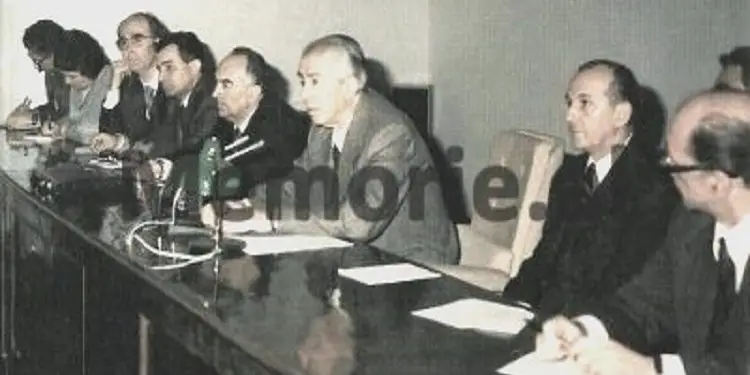
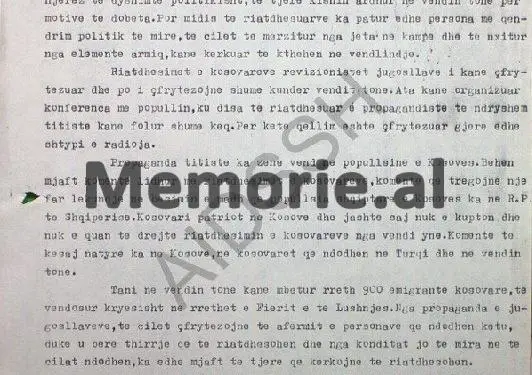
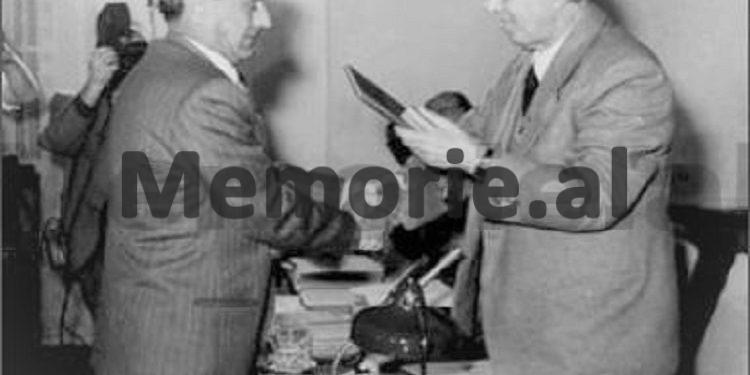
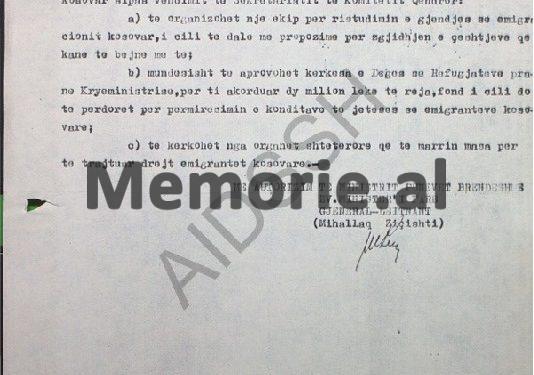
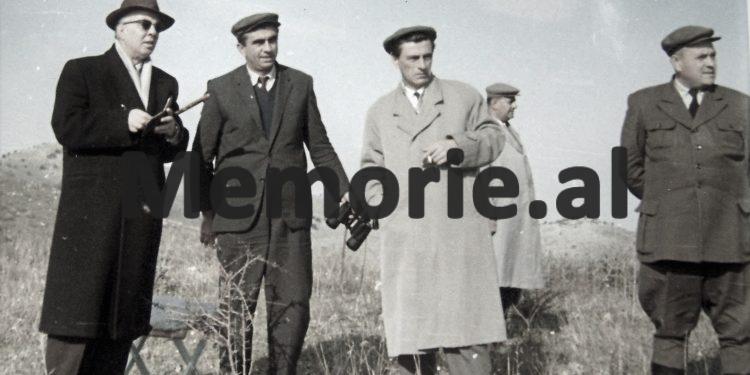
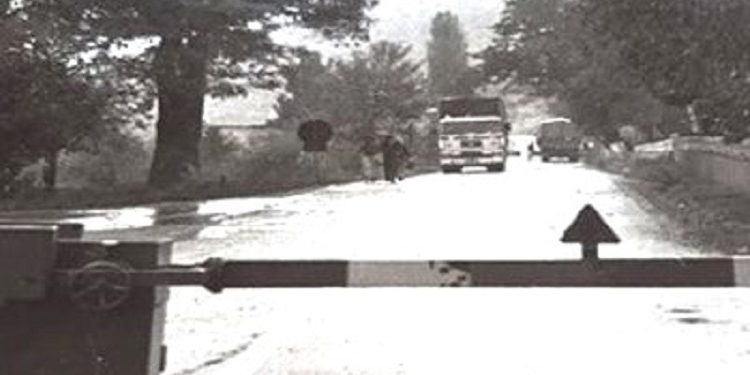



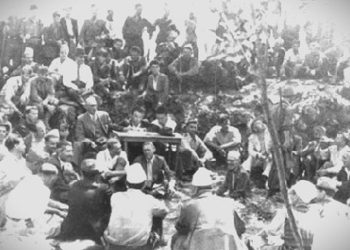
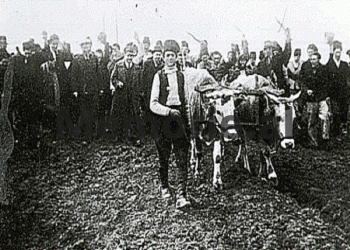
![“They have given her [the permission], but if possible, they should revoke it, as I believe it shouldn’t have been granted. I don’t know what she’s up to now…” / Enver Hoxha’s letter uncovered regarding a martyr’s mother seeking to visit Turkey.](https://memorie.al/wp-content/uploads/2026/01/Dok-1-350x250.jpg)
